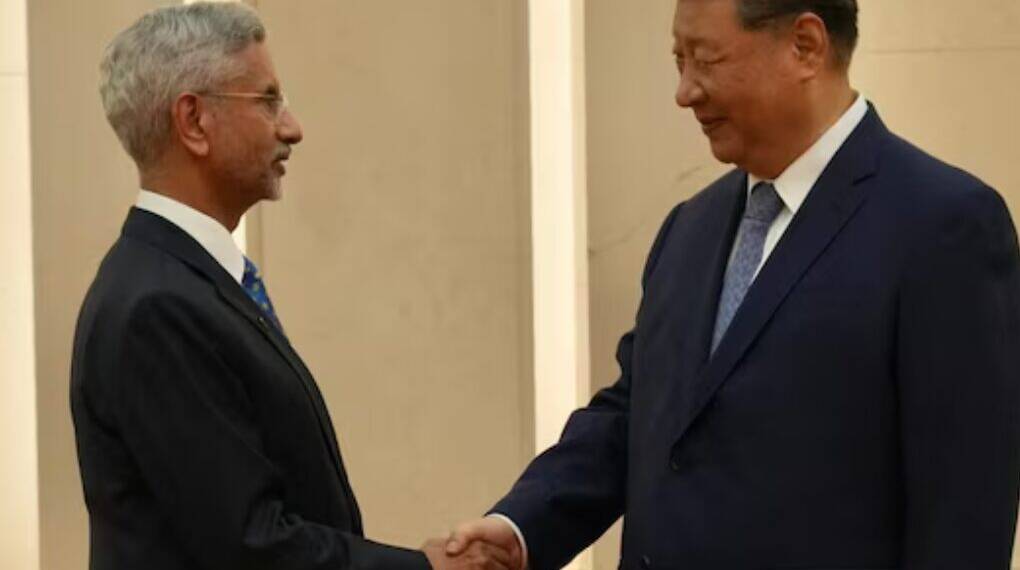India’s External Affairs Minister S. Jaishankar’s meeting with Chinese President Xi Jinping this week comes at an extraordinary moment in international relations.
The bilateral engagement held in Beijing as part of the Shanghai Cooperation Organisation (SCO) foreign ministers’ conclave unfolded under the shadow of sweeping new warnings from NATO and the United States of secondary sanctions on BRICS nations, including India and China, for their ongoing trade with Russia.
The confluence of these events invites rigorous scrutiny, not only for their regional import but for their potential to rewire the global security and trade architecture.
BRICS at a Crossroads
NATO Secretary General Mark Rutte’s threat of 100% secondary sanctions marks an unprecedented escalation in Western efforts to stifle Russia’s war economy. He explicitly named India and China, alongside Brazil, urging these countries to “make the phone call” to Russian President Vladimir Putin and push him into serious peace negotiations—”because otherwise this will slam back on Brazil, on India and on China in a massive way,” Rutte warned.
The United States, under President Donald Trump, added gravity by announcing further military aid to Ukraine and setting a 50-day deadline for Russia to negotiate, after which secondary sanctions would be imposed on countries continuing Russian trade.
India and China, as central drivers of the BRICS economy and Russia’s energy trade, now find themselves facing difficult diplomatic and strategic choices. Against this tense backdrop, Jaishankar’s interactions in Beijing offered both symbolism and a pragmatic rehearsal of a multipolar world order under exceptional strain.
Jaishankar-Xi Meeting
During the SCO meeting, Jaishankar met President Xi along with other foreign ministers before heading to a conclave in Tianjin. On social media, Jaishankar described the engagement as an opportunity to “apprise President Xi of the recent development of our bilateral ties,” emphasizing the “value [of] the guidance of our leaders in that regard.”
He also conveyed greetings from India’s President Droupadi Murmu and Prime Minister Narendra Modi to Xi—a careful gesture reflecting both protocol and India’s intent not to escalate friction amid mounting external pressure.
The Indian foreign minister’s meeting with his Chinese counterpart, Wang Yi, further drilled down into the ongoing attempt to “normalise” relations after years of tension along the Line of Actual Control (LAC). Jaishankar stressed building on “good progress” post last October’s disengagements while clearly articulating the need for further de-escalation at the border and the removal of “restrictive trade measures and roadblocks” to fuller economic cooperation.
These positions reinforced India’s principled stance: sovereignty in energy and economic strategies, but a willingness to stabilize relations where possible.
Global Dynamics and Secondary Sanctions: The Larger Calculus
The NATO and U.S. sanctions threat is not simply a cudgel wielded against Russia’s allies, but a test of the BRICS states’ ability to chart independent courses in an era of weaponized finance.
The sanctions proposal seeks to close off economic “back doors” keeping Russia’s economy afloat, essentially forcing a global choice: trade with Moscow or risk economic isolation and penalties from the West.
What Does It Mean for India and China?
Both countries source deeply discounted Russian oil and gas that fuel domestic growth. Cutting Russian supplies cold would spike energy costs and ignite inflation.
Both nations chafe at Western attempts at policy dictation. India has signaled that its energy security is a “pragmatic economic choice,” not open to outside veto. China too is unlikely to yield on strategic alignments under external threats.
Both powers, as also Brazil, now weigh whether limited compromise or symbolic pressure on Moscow could forestall the harshest Western financial punishments.
The Biden-era and now Trump-driven American policy represents an overt political push that collides with BRICS countries’ vision of a multipolar and less U.S.-centric global order.
These developments are happening amid calls in Washington for tariffs as high as 500% on goods from India, China, or any nation that continues to import Russian energy.
Multipolarity on Trial: BRICS’ Potential Response
As Jaishankar met with Xi and Wang Yi, he also held talks with Russian foreign minister Sergey Lavrov and Iran’s Abbas Araghchi on the summit’s sidelines, reviewing bilateral ties and regional developments, demonstrating India’s relentless pursuit of multi-alignment even as pressure mounts from NATO.
The SCO’s framework provided additional cover for India, China, and Russia to appear united, yet each country remains cautious, with profound national interests at stake.
Theoretically, BRICS could respond in several ways:
By publicly reaffirming their commitment to economic ties with Russia and developing alternative payment and trade mechanisms, such as circumvention of the dollar system.
By slowing purchases of Russian oil, or signaling openness to pressure Moscow for peace, to reduce exposure to sanctions.
By avoiding overt signals while quietly recalibrating trade flows to minimize both Western and Russian ire.
Tensions Set to Escalate?
Both India and China are well aware that NATO’s threat, if delivered, could trigger economic blowback—higher commodity prices, stressed supply chains, and global recessionary tremors far beyond Russia, India, or China themselves.
Yet if BRICS bends to Western will, the very idea of multipolarity, their rallying concept would face a profound test, with lasting consequences for South-South cooperation. If they resist, a new era of global economic fragmentation may dawn.
The Jaishankar-Xi meeting, while focused on regional normalization, now takes on global import as NATO and the U.S. move to turn economic engagement into a litmus test of geopolitical loyalty. Whether India and China can successfully hedge defending their interests amid rising costs and threats will define not just their own trajectories, but the integrity of the emerging multipolar world itself. As Jaishankar’s diplomacy makes clear, the choices made in Delhi and Beijing today will reverberate well beyond their borders and may decide the shape of the global order for years to come.








